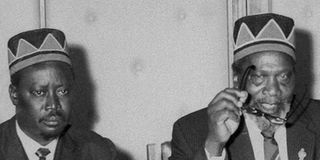Kenya’s political eclipse: Part I

Kenya's first Vice President Jaramogi Oginga Odinga and the country's founding father Jomo Kenyatta. The divorce between Mr Jaramogi Oginga Odinga and Mzee Kenyatta was the moment at which Kenya lost it.
Kenya is dying a slow painful death, one savage machete cut after another.
We are haemorrhaging from all orifices. What started as a trickle has turned into a river of blood. Our national bloodstream is being sucked dry.
Soon — very soon, I fear — we may become a failed state. All the indices of national health are rapidly going where all bad things go — south. Kenya has lost its once commanding position as one of the five anchor states in Africa.
In East Africa, Kenya is now no more important than either Ethiopia or Tanzania, countries that were once its backyard. Kenya’s political and economic eclipse is nigh. We are rapidly sinking. The big questions are how and why.
In this first instalment of columns on the phenomenon of national death, I interrogate the history of the architecture of Kenya’s slow-burning collapse, which has now turned into a national Armageddon.
Let me stipulate that as in biblical times, prophets are no longer born. In their place, we have only ordinary mortals. In political nomenclature, our mothers and fathers no longer sire visionary leaders. I don’t know why.
Perhaps it’s in the political diet of the historical moment we find ourselves in. We no longer have Julius Nyereres, Nelson Mandelas, or Thomas Sankaras. The only one who remains in that vaunted league is Kenya’s Raila Odinga. The rest are but political dwarfs. We are ruled by conmen.
Let me peel your eyes. First, the Kenyan state was founded on quicksand. At independence, true political and economic power did not pass to Kenyans. Kenya remained a client state — a puppet — of the West. In other words, the state was not legitimised through indigenisation.
A shallow façade of political independence was granted in the form of a national flag. To make matters worse, the two most important “independence” political fathers fell apart. Mzee Jomo Kenyatta and Jaramogi Oginga Odinga could not see eye to eye.
Mzee Kenyatta, once a true nationalist and pan-Africanist, became a parochial and conservative Kikuyu hegemon. Mr Jaramogi Oginga Odinga, a left-leaning nationalist, refused to cave in to the Burning Spear. The latter politically destroyed the former.
The divorce between Mr Jaramogi Oginga Odinga and Mzee Kenyatta was the moment at which Kenya lost it. This is why. Faced with a hostile international system, Mr Kenyatta and Mr Jaramogi Oginga Odinga needed to unite and create a vision for Kenya. I agree both were towering political figures, the likes of which we have rarely seen since then, but therein lay the tragedy.
Moment of rupture
Instead of that moment of rupture, the two political titans should have come together, made compromises, and created a template for Kenya’s political glide path. But other terrible things happened in the 1960s. Political genius Tom Mboya was assassinated to prevent him from succeeding Mzee Kenyatta. After that, Mzee Kenyatta created a draconian de facto one-party state.
Second, rather than create a nation by forging a national consciousness, Mzee Kenyatta led in the drastic tribalisation of Kenya. Unlike Tanzania, where Mwalimu Julius Nyerere forged a nation out of some 125 ethnic groups, Kenya with just around 40 ethnic groups utterly failed to cohere as a nation. Instead, Mzee Kenyatta encouraged ethnic fiefdoms with primordial kingpins.
There was an opportunity to create a Kenyan prototype, but Mzee Kenyatta went in the opposite direction, giving tremendous power and influence to his Kikuyu group. He then strengthened and corralled other kingpins to become an imperial president. That’s how Kenya was permanently fragmented and balkanised into ethnic cocoons. Henceforth, Kenya’s politics has pivoted not on ideology, or philosophy, but on ethnicity.
Third, Kenya’s political and business elite — who are often one and the same — have since then used the state as the wellspring of their wealth. But rather than create real wealth, they ventured into predatory practices in sectors of the economy that have not created a genuine industrialised economy.
That is why Kenya’s economy is still dependent on outsiders to process its raw materials into finished products. That is why Kenyans cannot build a road but instead rely on outsiders who fleece them. Bottom line is that our elite lack an economic and political vision for the country. Our elite are intellectually bankrupt. They think that building apartments is creating wealth. Importantly, Kenya’s elite have failed to internalise liberal theory and philosophy.
Finally, society has regressed and decayed morally in virtually every aspect. But I put political immorality as the most important deficit facing Kenya. Back in the day, the most respected person in society, and especially in the village, was the school teacher.
Today, the teacher has become one of the most disregarded members of Kenya’s social fabric. Instead, the dirty thieving politician, the drug dealer, the real estate crook, the land grabber and the pilferer of government funds in the counties and national government have become Kenya’s heroes.
The political prostitute is in vogue. Next Sunday, in Kenya’s Political Eclipse Part II, I look at Kenya’s republic of fear.
Makau Mutua is SUNY Distinguished Professor and Margaret W. Wong Professor at Buffalo Law School, The State University of New York. @makaumutua.





